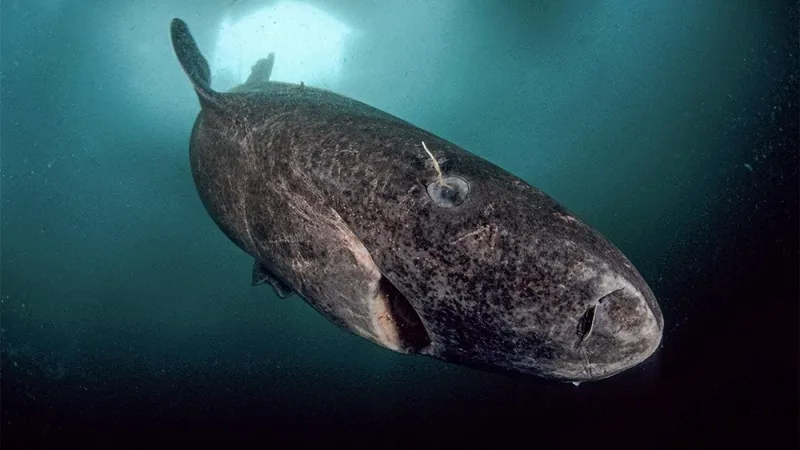
Secrets of the Greenland Shark: Vision Despite Centuries of Darkness
2025-05-14
Author: Amelia
Meet the Greenland Shark: The Sea's Oldest Resident
The Greenland shark, known scientifically as Somniosus microcephalus, stands out as one of the ocean's most fascinating giants, with a lifespan reaching up to a staggering 400 years. This Arctic and North Atlantic dweller has intrigued scientists and shark enthusiasts alike, but a pressing question remained: do these ancient sharks possess functional eyesight?
A Dim World and the Fight for Vision
Living in icy waters that can plunge to a brisk 30°F (-1.1°C) and depths of nearly 9,800 feet (3,000 meters), Greenland sharks navigate some of the darkest realms of the ocean. Many of these sharks are afflicted by parasitic copepods that attach themselves to their eyes, leading many to believe that their vision must surely be compromised. Surprisingly, recent research has illuminated a different narrative.
Revealing the Truth: Vision Undiminished
Recent studies employing genomic sequencing, retinal imaging, and molecular analysis have unveiled a surprising fact: Greenland sharks can still see, and their vision remains remarkably intact despite the passage of centuries. Contrary to species that have adapted to total darkness and lost their sight, this resilient predator maintains its full range of retinal structures.
The Truth About Their Vision
Led by researcher Lily Fogg at the University of Basel, the scientific team discovered that Greenland sharks possess densely packed rods in their eyes, specialized for low-light vision. These rods function effectively, showcasing no signs of aging-related degeneration, a stark contrast to the general pattern observed in other long-lived creatures.
An Evolutionary Marvel
So, what's their secret to retaining such vision? It lies in their heavy reliance on a rod-dominated retina, designed to thrive in dim conditions. Unlike other species that prioritize color and bright-light vision, the genetic data revealed that nearly all cones, responsible for such vision, are either absent or nonfunctional.
Stability in Time: A Biological Wonder
A remarkable revelation from the research was how well these rod-based visual systems withstand the test of time. The study showed that essential vision genes remain active, with no structural faults in key retinal cells. For an animal potentially older than some nations, this preservation is nothing short of extraordinary.
Genetic Resilience and Environmental Influence
The researchers suggest that the shark’s impressive capacity for genomic stability plays a crucial role in maintaining retinal health over centuries. Effective DNA repair mechanisms may contribute to this longevity, possibly bolstered by the cold water that reduces cellular deterioration.
A Still Functional Eye in a Dark World
Despite the presence of parasites, Greenland sharks are not completely blinded; their optic tectum remains comparable in size to that of other sharks, hinting at the ongoing behavioral relevance of sight. Moreover, they have retained a tapetum lucidum — a layer that enhances light sensitivity, akin to the reflective feature found in nocturnal animals.
A New Perspective on Longevity and Vision
This groundbreaking study challenges the notion that longevity and vision cannot coexist in the deep sea. The Greenland shark demonstrates an exceptional adaptation, keeping its ability to see functional, albeit tailored to its shadowy habitat. The findings underscore the remarkable evolutionary ingenuity of vertebrate senses in harsh environments, showcasing how organ functionality can endure over thousands of years.









 Brasil (PT)
Brasil (PT)
 Canada (EN)
Canada (EN)
 Chile (ES)
Chile (ES)
 Česko (CS)
Česko (CS)
 대한민국 (KO)
대한민국 (KO)
 España (ES)
España (ES)
 France (FR)
France (FR)
 Hong Kong (EN)
Hong Kong (EN)
 Italia (IT)
Italia (IT)
 日本 (JA)
日本 (JA)
 Magyarország (HU)
Magyarország (HU)
 Norge (NO)
Norge (NO)
 Polska (PL)
Polska (PL)
 Schweiz (DE)
Schweiz (DE)
 Singapore (EN)
Singapore (EN)
 Sverige (SV)
Sverige (SV)
 Suomi (FI)
Suomi (FI)
 Türkiye (TR)
Türkiye (TR)
 الإمارات العربية المتحدة (AR)
الإمارات العربية المتحدة (AR)